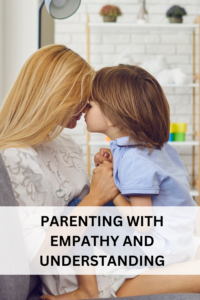
With the wave of gentle parenting, parenting with empathy and understanding has been a popular topic. Parenting is a multifaceted journey, filled with joys, challenges, and countless growth opportunities.
Empathy—the ability to understand and share others’ feelings—is at the heart of effective parenting. When parents approach their role with empathy and understanding, they lay the groundwork for strong, healthy relationships with their children.
In this comprehensive article, we will delve into the intricacies of empathetic parenting, offering practical tips for parenting with empathy and understanding.

Hi! My name is Marra and I’m a mama and a pediatric occupational therapist who has years of experience working with children with different developmental needs and helping their parents navigate the ups and downs of child development.
I loved being a support person for parents learning about child development and their child’s individual needs. I am also a mama committed to parenting with empathy and understanding when raising my own daughter.
This post is all about the tips you need for parenting with empathy and understanding. With these strategies, not only will you build an incredibly supportive bond with your own child, but model empathy and understand for them, teaching these important skills.

17 tips for parenting with empathy and understanding
The Power of Active Listening
Yes, we all want our children to listen to us, but the best way to teach them to listen to you is to model it, and be an active listener for them. We all want to be heard and understood, even our little ones.
Active listening is the cornerstone of empathetic communication. When we practice active listening, we give our full attention to our children, demonstrating that we value their thoughts and emotions.
Make eye contact, nod in acknowledgment, and refrain from interrupting. Reflect back what your child has said to show that you understand and validate their feelings.
They will begin to learn this behavior and become a great listen to not only you, but also to other family members and their friends..
Creating a Safe Space for Emotional Expression
The rule in my house is that all feelings are welcome but not all behavior is. My daughter knows that it’s ok to be mad at mom and express it calmly, but it is not ok to be unkind to others.
Children need a safe space to express their emotions without fear of judgment or criticism. Encourage your child to share their feelings openly, whether they’re happy, sad, angry, or scared.
Validate their emotions by saying things like, “I can see that you’re feeling upset right now,” or “It’s okay to feel angry, but let’s talk about what happened.”
You can also share your feelings with them when you are mad or frustrated so they know that it is normal to experience all different kinds or feelings..
modeling Empathy
Children learn by example. They may not always listen but they are always watching. When parenting with empathy and understanding. it’s essential for parents to model empathetic behavior in their interactions with others.
Show kindness and compassion towards family members, friends, and strangers alike. When your child sees you practicing empathy in your daily life, they’re more likely to emulate that behavior.

Acknowledging Mistakes with Grace
Parents are human, and they make mistakes just like everyone else. When you slip up, whether it’s raising your voice in frustration or forgetting an important promise, acknowledge your mistake and apologize sincerely.
This teaches your child the importance of taking responsibility for their actions and making amends when necessary. Not only is this important for parenting with empathy and understanding but you are also teaching them that it is ok to make mistakes because everyone does.
Setting Boundaries with Empathy
Boundaries are essential for parenting with empathy and understanding as well as maintaining a healthy parent-child relationship.
Set clear and consistent boundaries, but do so with empathy and understanding. Explain the reasons behind the rules, and be open to discussing any concerns or questions your child may have.
You can set and hold boundaries in a kind and calm way and still provide empathy and understanding to your child. All boundaries should be communicated clearly and kindly.

Fostering Problem-Solving Skills
Empower your child to become a critical thinker and problem solver by involving them in the decision-making process. Encourage them to brainstorm solutions to challenges they encounter, and offer guidance and support as needed.
This not only builds their problem-solving skills but also boosts their confidence and self-esteem. You can model solving problems for them so they learn this is part of life, not just childhood.
Cultivating Empathy through Perspective-Taking
Help your child understand that everyone sees the world through their own unique lens. Encourage them to consider other people’s perspectives and imagine how they might feel in different situations.
This fosters empathy and compassion towards others. My favorite way to do this is by reading all different kinds of books with my daughter.
Validating Feelings vs. Behavior
It’s important to distinguish between validating your child’s feelings and correcting their behavior. You can acknowledge and validate your child’s emotions while still holding them accountable for their actions.
For example, you might say, “I understand that you’re feeling frustrated, but hitting is not an appropriate way to express your anger.”
Establishing Rituals of Connection
Parenting with empathy and understanding can involve establishing routines and stability. Regular rituals or routines can strengthen the bond between parents and children.
Whether it’s a nightly bedtime story, a weekly family game night, or a monthly outing to your favorite park, these rituals provide opportunities for meaningful connection and quality time together.
Embracing Mindful Parenting
Mindfulness can be a very effective tool for parenting with empathy and understanding. Mindfulness involves being fully present in the moment and accepting things as they are, without judgment.
Incorporate mindfulness practices into your daily routine, such as deep breathing exercises, mindful listening, or taking nature walks with your child. This helps you stay calm and centered, even in the midst of chaos.
Mindfulness can also be a great practice that you can teach to your child by modeling it for them and encouraging them to participate in mindfulness activities with you.
Encouraging Independence with Support
As your child grows, encourage their independence by giving them age-appropriate responsibilities and allowing them to make choices. Offer guidance and support along the way, but give them space to learn from their experiences and develop confidence in their abilities.

Practicing Patience and Flexibility
Patience and flexibility both need to be a part of parenting with empathy and understanding. Parenting is a marathon, not a sprint, and it requires a great deal of patience and flexibility.
Be patient with yourself and your child as you navigate the ups and downs of family life. Stay flexible in your approach, adapting to your child’s changing needs and developmental stages.
Utilizing Positive Discipline Techniques
Discipline should focus on teaching rather than punishing. I always say, teach your child what TO DO instead of focusing on what NOT TO Do.
Use positive discipline strategies, such as natural consequences, logical consequences, and positive reinforcement, to encourage your child to learn from their mistakes and make better choices in the future.
Celebrating Diversity and Inclusion
Teach your child to appreciate and celebrate diversity in all its forms. Expose them to books, movies, and experiences that highlight different cultures, races, and perspectives. Encourage them to embrace diversity and treat others with kindness and respect.
Instilling Gratitude and Kindness
Gratitude and kindness are also important to consider when parenting with empathy and understanding. Teach your child to appreciate and celebrate diversity in all its forms by modeling it.
Expose them to books, movies, and experiences that highlight different cultures, races, and perspectives. Encourage them to embrace diversity and treat others with kindness and respect.

Seeking Support When Needed
Parenting can be overwhelming at times, and it’s okay to ask for help. Reach out to friends, family members, or professional resources for support and guidance when you need it. Remember that you don’t have to navigate the challenges of parenting with empathy and understanding alone.
Prioritizing Self-Care
Finally, remember to prioritize self-care as a parent. Take care of your physical, emotional, and mental well-being by engaging in activities that nourish and rejuvenate you. When you take care of yourself, you’re better equipped to show up with empathy and understanding for your child.
Parenting with empathy and understanding is a journey that requires patience, compassion, and a willingness to grow and learn alongside your child. By practicing active listening, creating a safe space for emotional expression, modeling empathy, and fostering problem-solving skills, parents can nurture strong, healthy relationships with their children.
Remember that empathy is a skill that can be developed and strengthened over time, and by incorporating these tips into your parenting approach, you can help your child become a compassionate and empathetic individual who contributes positively to the world around them.
